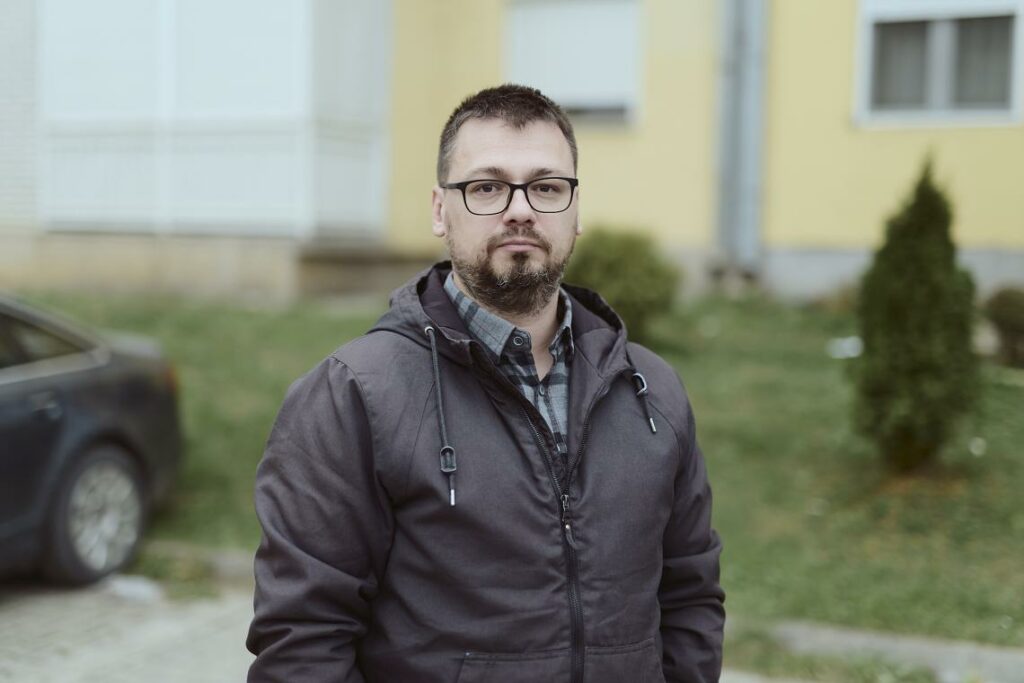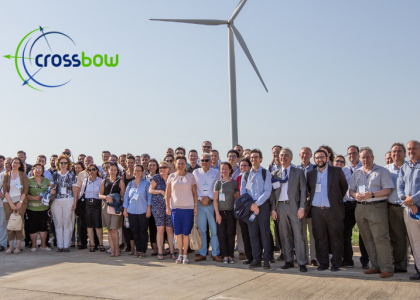With the support of UNICEF and the EU, a new model of family-oriented early intervention for children
with developmental delays and disabilities is being piloted in Bijelo Polje and Kotor
Bijelo Polje, 20. novembar 2023. – “Institutions now have a human face through which we get everything we need and work together to help our child,” says Željka Veličković, explaining the model of family-oriented early intervention.
While Željka is talking to us, her husband Novica and social worker Stevan Anđelković are playing with her three-year-old son Vukašin. The Veličkovićes’ daughter is at school, and if she were to return now, she would find the toys out and two adults laughing and swapping toys with her brother, and calling him by his nicknames Vuk and Vule.
Željka says that a year and a half ago they noticed that their son had some risk in his development. They took the usual route of visiting institutions.
“We visited a lot of institutions and were not satisfied. Six months ago, a psychologist from the Health Centre suggested that we join this early intervention programme, and it’s a completely different and better story. We already feel relieved and much more empowered as a family facing this challenge.” ─ Željka Veličković
With the support of UNICEF and the EU, a new model of family-oriented early intervention for children with developmental delays and disabilities is being implemented in Bijelo Polje, where families are provided with assistance from a team of experts from the Health Centre, the kindergarten, the Centre for Social Work and the Daycare Centre.
In this city, the practice of complicated communication between the professionals who are there to help children and parents is changing. Instead of the parent going to the institution with the child and conveying to the caregiver what the speech therapist has said, and to the speech therapist what the psychologist has found out, now one of the experts has continuous contact with the family, which includes home visits, and coordinates everything.
“We are trying, this is a challenge for us too and we are learning a lot from this programme,” says Željka regarding her experience with the new programme. She adds that, as a family, they are much more relieved and that, in addition to them as parents, their daughter also participates in everything: “That barrier has come down when it comes to the therapist and the child. We have home visits and now it’s all tailored to the child. But before that, it all happened within the Health Centre. It is incomparably better and the child accepts it much better.”
The primary provider of support for the Veličković family is psychologist Danijela Femić. She says that one of the most important things that happened with this project is that the medical workers moved out of the usual model of work: “We have always been guided by the idea that we need to have as many documents as possible, as many diagnoses as possible, and then we will act on that basis. Now the paradigm is different. Let’s see what the child can do, what the child’s strengths are, how to improve those strengths, without labelling the child.”
She describes how, when she first came for a home visit, she thought that she was now in the position her own parents had been in years ago. “They came to our place, there was a table between us, they were on our home terrain, but now, we were the ones wearing the white coat, we were the ones writing something down. However, when we first came for a home visit, I thought ‘This is their terrain’. We have to behave in a way that pleases the parents. And then you realize that you have entered a family and that, for the first time, you are looking at an entire day. It happened to us that a parent would says ‘My child does this at home’, and we respond – but he doesn’t do it in the office. This helped us to get a picture of a whole day, to understand how that child functions, and then to base the strengthening of the resources we already have on that.”
As part of this programme, which is implemented in Bijelo Polje, there are 12 experts involved, and 12 families are included in the intensive model, which provides for home visits, while 247 families use the less intensive model.
Femić, the psychologist, points out that, thanks to the Veličković family, another 10 families have included their children in the treatment. “The other day, a person close to the Veličković family came and brought their child for preventive reasons. When they heard that Novica was bringing his child, they said ‘Great, we will go too!’ They explained to me that they wanted to come as a precaution, to see what they could improve with their child.”
She thinks it’s a big deal, especially in a small community. She also explains that the fact that the Centre for Disabled Children sign is still up in the Health Centre in the department where she works also causes discomfort to people.
“We are working on changing it into a Development Counselling Centre, because we work with all children and all children have needs. But it’s going slowly for now.” ─ Danijela Femić, psychologist
The programme, which is family-oriented and based on support through daily routines and activities in a natural environment, at home or in a kindergarten, is implemented based on international experiences, mostly relying on a model that has been applied in Portugal for the last 15 years. A similar model is also used in several cities in Serbia.
“We were recently there for training and to meet our colleagues from Niš. That’s where I saw the purpose of this programme and our team. There was a big difference between the experiences of the two mothers – one who gave up on early support and the other who was determined and persisted in using this programme. The latter mother is cheerful, regardless of the fact that her child has serious problems. And the child has also made progress, has not stagnated, but has progressed as much as possible. She was eager to learn and work more,” says social worker Stevan Anđelković.
“The better you get to know the routines, the deeper you get to know the families and the easier it is to help. It helps them, and it helps us too.” ─ Stevan Anđelković, social worker
Željka explains with a smile that in the last six months visible progress has been achieved: “As parents, we have learned how to approach our child, we have also changed our perspective and way of acting. Therefore, everything is adapted to the child, both at home and in the kindergarten. This programme has made it possible not only for the child to adapt to the kindergarten, but also for the kindergarten to adapt to the child, in a way. The peer community is very important for his development. It’s the same at home – we adapted all the routines, everyday situations to him through play.”
The experience from Bijelo Polje and this pilot project should be a good guide to other municipalities and the state on how to provide better and more effective help to children and parents, but also to the experts to achieve better results in their work.






